#paul andré robert
Text

Macroglossum stellatarum | Les Papillons dans la Nature (1934) | Paul-André Robert (1901-1977)
1K notes
·
View notes
Text
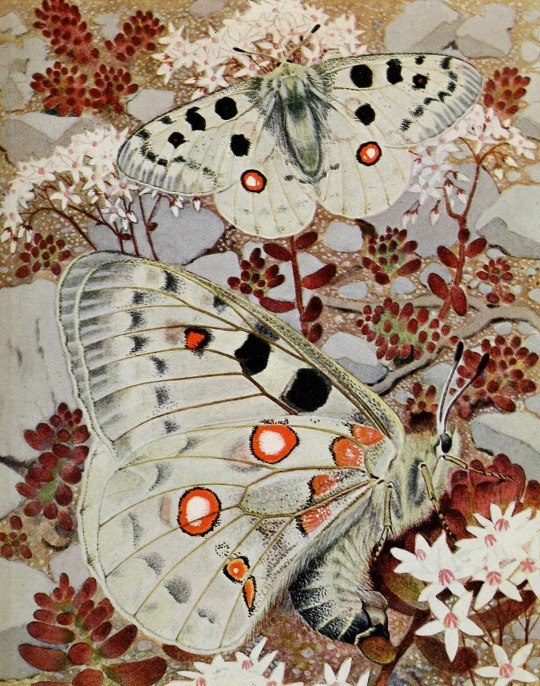
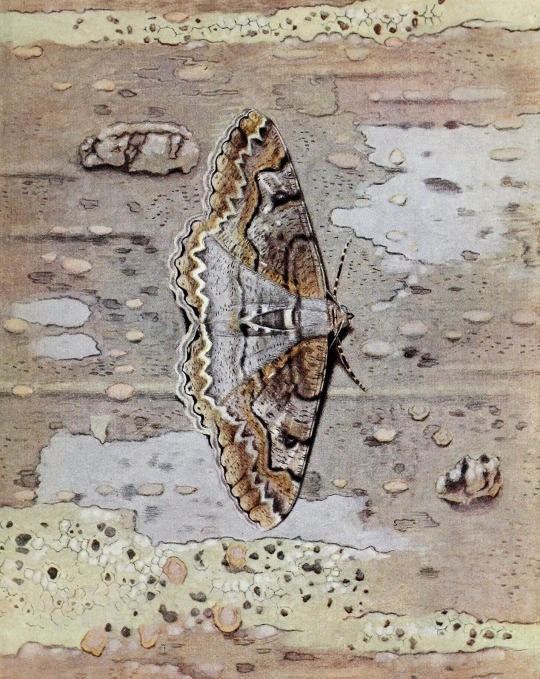


Plates from Les Papillons dans la nature (1934) by Paul-André Robert.
#Paul-André Robert#art#swiss art#illustration#illustrations#animals in art#animals#insects#butterflies#moths#butterfly#moth#20th century art#20th century#1930s#30s#naturalist#aesthetic#nature
41 notes
·
View notes
Text
Bruce Chatwin (1940-1989)
Het is al 35 jaar geleden dat “de Engelse Boudewijn Büch” Bruce Chatwin is overleden.
Continue reading Untitled
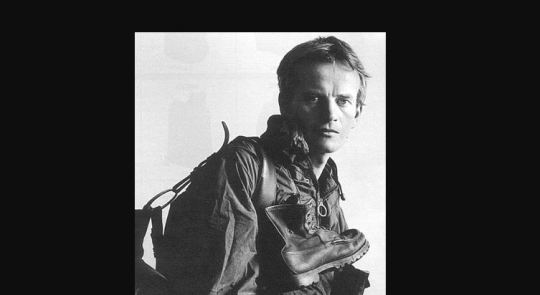
View On WordPress
#André Malraux#Boudewijn Büch#Bruce Chatwin#Eileen Gray#John Betjeman#Nicholas Shakespeare#Paul Theroux#Robert Mapplethorpe#Salman Rushdie
1 note
·
View note
Video
n96_w1150 by Biodiversity Heritage Library
Via Flickr:
Les papillons dans la nature Neuchâtel ;à 30ditions Delachaux and Niestlé, s.a., 1934. biodiversitylibrary.org/page/33079973
#Insects#Lepidoptera#Pictorial works#University of Illinois Urbana Champaign#bhl:page=33079973#dc:identifier=http://biodiversitylibrary.org/page/33079973#arthropoda#BHLarthropod#artist:name=Paul-André Robert#artist:viaf=42017979#butterflies#entomology#taxonomy:binomial=Polygonia c-album#taxonomy:binomial=Vanessa c-album#taxonomy:common=Comma#taxonomy:common=Gamma#taxonomy:binomial=Viburnum lantana#taxonomy:common=Wayfaring-tree#flickr#flower#flowers#plant#plants#wildflower#wild flower#wildflowers#wild flowers#botany#botanical#botanical drawings
0 notes
Text
Un año en libros - 2022
Afortunadamente, éste fue un año en el que pude darme el tiempo de priorizar la lectura. Todavía no tengo escritores favoritos, como así tampoco géneros o estilos. Estoy teniéndome paciencia y dándome la oportunidad de conocer autores de diferentes nacionalidades, que abordan temas diferentes y que traman de maneras curiosas y singulares. Tengo la suerte de poder decir que la mayoría de los libros que leí durante este año fueron enriquecedores. Más o menos favoritos, me han nutrido con sus enseñanzas y me han entretenido con sus historias. Llevo en mí una parte de todos ellos y la llevaré por siempre ♥. Sin embargo, decidí tomarme el tiempo de hacer una lista (sin un orden específico) de los libros que más me gustaron de este 2022.
La casa de la araña (Paul Bowles, 1955): “Escrita en 1955, detecta con maestría las irresolubles tensiones del mundo árabe, las mismas que estallarán varias décadas más tarde. La trama reúne a tres personajes disímiles: John Stenham, un escritor norteamericano devoto de la antigua cultura del lugar y que detesta al imperialismo francés que por entonces dominaba Marruecos; Polly Veyron, turista norteamericana de buena conciencia que defiende el desarrollo de los países oprimidos, y Amar, un muchacho marroquí analfabeto que se gana la vida en la calle, un musulmán ortodoxo que desprecia por igual el progresismo impío de los revolucionarios y la ocupación colonial”.
Los Testamentos (Margaret Atwood, 2019): “El estado de Gilead se constituyó en América del Norte después de una catástrofe nuclear y bioquímica, y de una guerra sobre las ruinas de la sociedad libre preexistente. Es una teocracia autoritaria que tiene los rasgos del puritanismo estadounidense. Los fundamentalistas misóginos están convencidos de que la infertilidad generalizada de la población es el castigo de Dios por la promiscuidad, la anticoncepción y el aborto, y las han prohibido. Los hombres ejercen todo el poder, las mujeres no tienen derechos. No se les permite leer ni escribir, ni poseer nada. Si todavía son capaces de tener hijos, pueden convertirse en Criadas, y son asignadas a los hombres más poderosos del estado como hembras que habrán de asegurar la supervivencia de la humanidad, que está en peligro de extinción”.
Bajo este sol tremendo (Carlos Busqued, 2009): “La novela narra la historia de un hombre desempleado llamado Javier Cetarti quien, tras recibir la noticia de que su madre y hermano han sido asesinados «a escopetazos» en el pueblo de Lapachito por Daniel Molina, el concubino de su madre, decide ir con la intención de reconocer los cadáveres, encontrándose allí con el suboficial retirado Duarte, albacea de Molina”.
Matar a un Ruiseñor (Harper Lee, 1960): “Disparad a todos los arrendajos azules que querais, si podeis acertarles, pero recordad que es un pecado matar a un ruiseñor. Este es el consejo que da a sus hijos un abogado que esta defendiendo al verdadero ruiseñor del clásico de Harper Lee: un hombre de color acusado de violar a una joven blanca”.
Encuéntrame (André Aciman, 2019): “Sami Perlman conoce a una mujer más joven llamada Miranda mientras viaja en tren a Roma. Los dos se acercan rápidamente y entablan una relación romántica. Mientras están en Roma, la pareja visita al padre enfermo de Miranda, asiste a una conferencia pública organizada por Sami y se encuentra con Elio”.
Una soledad demasiado ruidosa (Bohumil Hrabal, 1976): “Desde hace treinta y cinco años, Hanta trabaja en una trituradora de papel destruyendo libros y reproducciones de cuadros. En cada una de las balas de papel que prepara conviven libros, litografías, ratoncillos aprisionados y su propio esfuerzo. Pero para él, esos libros son mucho más que papel para prensar: son toneladas de saber que la humanidad ha ido acumulando a lo largo de los siglos y que Hanta ha ido adquiriendo con su trabajo”.
Hamnet (Maggie O’Farrel, 2020): “Agnes, una muchacha peculiar que parece no rendir cuentas a nadie y que es capaz de crear misteriosos remedios con sencillas combinaciones de plantas, es la comidilla de Stratford, un pequeño pueblo de Inglaterra. Cuando conoce a un joven preceptor de latín igual de extraordinario que ella, se da cuenta enseguida de que están llamados a formar una familia. Pero su matrimonio se verá puesto a prueba, primero por sus parientes y después por una inesperada desgracia”.
En la tierra somos fugazmente grandiosos (Ocean Vuong, 2019): “La novela está escrita en la forma de una carta por un vietnamita-estadounidense joven apodado Perro Pequeño, cuya vida refleja la de Ocean Vuong. La carta está escrita a la madre de Perro Pequeño, llamada Hong, más a menudo traducido como Rosa (hồng)”.
La vuelta al mundo en ochenta días (Julio Verne, 1873): “Phileas Fogg es un adinerado caballero inglés que lleva una tranquila y solitaria vida en Londres. A pesar de su fortuna, Phileas Fogg vive modestamente y lleva a cabo sus hábitos y costumbres con una precisión matemática. Se sabe muy poco de su vida social aparte de que es miembro del Reform Club, donde pasa la mayor parte del día. Tras despedir a su sirviente por traerle el agua para afeitarse a una temperatura ligeramente más baja de lo ordenado, Phileas Fogg contrata al joven francés Jean Passepartout como sustituto”.
La Isla del Tesoro (Robert Louis Stevenson, 1883): “Jim Hawkins es el hijo del dueño de una posada llamada “Almirante Benbow”, a la que un día llega para alojarse un hombre muy peculiar que canta canciones marineras y se hace llamar capitán. Este señor le pide a Jim que le avise si se acerca un hombre con una sola pierna. A cambio de vigilar, el hombre le da una paga cada mes. Jim no ve a ningún hombre con una sola pierna, sino que fue un hombre seboso el primero que se acercó a la posada preguntando por él. Más tarde un ciego llamado Pew pregunta por el capitán, que al parecer se llama Billy Bones”.
Historia de dos ciudades (Charles Dickens, 1859): “Jarvis Lorry, gerente del banco Tellson, recibe la noticia de que un antiguo cliente y amigo suyo, el célebre médico francés Alejandro Manette, está vivo y acaba de ser liberado, tras pasar 18 años recluido y olvidado en la prisión de Bastilla donde fue encerrado en el calabozo 105 de la torre norte por la sanguinaria familia de los Saint Evremont. Lorry se traslada a París junto a Lucía, hija del doctor Manette, y ambos lo encuentran en una taberna del barrio de San Antonio, donde pasa los días fabricando zapatos en compañía de Defarge, su antiguo criado”.
Las cosas que perdimos en el fuego (Mariana Enriquez, 2016): “Es la segunda colección de cuentos de la escritora, publicada en 2016 por la editorial Anagrama. La obra cuenta con 12 relatos enmarcados en el género del terror, en los que Enríquez explora temáticas sociales como la depresión, la pobreza, los desórdenes alimenticios, la desigualdad y la violencia de género”.
#libros#libros favoritos#libros del 2022#libros leidos#lectura#lectores#escritores#mariana enriquez#julio verne#robert louis stevenson#charles dickens#ocean vuong#paul bowles#andré aciman#margaret atwood#harper lee#busqued#maggie o'farrell#bohumil hrabal
1 note
·
View note
Text
VICTORIA DE LOS ANGELES AL METROPOLITAN MUSEUM DE NEW YORK 1960
VICTORIA DE LOS ANGELES AL METROPOLITAN MUSEUM DE NEW YORK 1960
Ahir vaig escoltar aquest magnífic liderabend de la millor Victoria de los Ángeles de l’any 1960 al Metropolitan Museum de Nova York.
El programa va ser un recull del repertori més habitual de la soprano catalana, amb Lully, Campra, Schubert, Schumann, Brahms, Ravel, Moreno Torroba, Granados, Nin, Obradors i Falla.
La mestrívola manera de dir i cantar cadascun dels compositors i estils, és una…

View On WordPress
#André Campra#Christoph Willibald Gluck#Enric Granados#Ferran Obradors#Franz Schubert#Jean-Baptiste Lully#Joaquim Nin#Johannes Brahms#Manuel de Falla#Maurice Ravel#Paul Berl#Robert Schumann#Salvador Moreno#Victoria de los Ángeles
0 notes
Note
would you be willing to share books or poems with your favorite or even pretty writing / prose? thank you 😊
oh Absolutely
books!
A Moth to a Flame, Stig Dagerman
For Two Thousand Years, Mihail Sebastian
The Bloody Chamber, Angela Carter
Her Body and Other Parties, Carmen Maria Machado
The House on Mango Street, Sandra Cisneros
The Waves, Virginia Woolf
Mrs Dalloway, Virginia Woolf
The Sea, John Banville
The Tenderness of Wolves, Stef Penney
Possession, A.S. Byatt
The Memory Police, Yoko Ogawa
The Thirteenth Tale, Diane Setterfield
The Book of Delights, Ross Gay
Wide Sargasso Sea, Jean Rhys
i am lewy, Eoghan Ó Tuairisc
A Tale for the Time Being, Ruth Ozeki
Seiobo There Below, Laszlo Krasznahorkai
The History of Love, Nicole Krauss
The Carpenters Pencil, Manuel Rivas
Books Burn Badly, Manuel Rivas (full disclosure: the language in this book is HARD)
How the Soldier Repairs the Gramophone, Saša Stanišić
From A to X: A Story in Letters, John Berger
Tess of the d'Urbervilles, Thomas Hardy
A Thousand Splendid Suns, Khaled Hosseini
Still Life with Oysters and Lemon, Mark Doty
The Unbearable Lightness of Being, Milan Kundera
Paris, When It's Naked, Etel Adnan
A Ghost in the Throat, Doireann Ní Ghríofa
Four Bare Legs in a Bed: Stories, Helen Simpson
South of the Border, West of the Sun, Haruki Murakami
A Field Guide to Getting Lost, Rebecca Solnit
Perfume: The Story of a Murderer, Patrick Süskind
The Things We Don't Do, Andrés Neuman
We Love Glenda So Much and Other Tales, Julio Cortázar
Letters to a Young Poet, Rilke
All We Saw, Anne Michaels (poetry)
Collected Poems of Vasko Popa, Vasko Popa (poetry)
Barefoot Souls, Maram al-Masri (poetry)
Without an Alphabet, Without a Face, Saadi Youssef (poetry)
poems!
"In Spite of Everything, the Stars" by Edward Hirsch
"I Can Tell You a Story" by Chuck Carlise
"The Roses of Saadi" by Marceline Desbordes-Valmore
"The Stare" by Sujata Bhatt
"Stolen Moments" by Kim Addonizio
"Moonlight Sonata" by Yannis Ritsos
"No Title Required" by Wislawa Szymborska
"I Sleep A Lot" by Czeslaw Milosz
"Prayer for the Mutilated World" by sam sax
"Try to Praise the Mutilated World" by Adam Zagajewski
"I Cannot be Known" by Paul Eluard
"The Cinnamon Peeler" by Michael Ondaatje
"Filling Spice Jars as Your Wife" by Kai Coggin
"Persimmons" by Li-Young Lee
"This Room and Everything in It" by Li-Young Lee
"When We With Sappho" by Kenneth Rexroth
"On Earth We're Briefly Gorgeous" by Ocean Vuong
"Not Even This" by Ocean Vuong
"Elegy of Fortinbras" by Zbigniew Herbert
"Wedding Poem" by Ross Gay
"Transformations of the Lover" by Adonis
"Cloves" by Saadi Youssef
"Punishment" by Seamus Heaney
"I've Dreamed of You So Much" by Robert Desnos
"Bleecker Street, Summer" by Derek Walcott
"Cave Dwellers" by A. Poulain Jr.
"De Humani Corporis Fabrica" by John Burnside
"The Great Fires" by Jack Gilbert
"The Forgotten Dialect of the Heart" by Jack Gilbert
783 notes
·
View notes
Text

When you get publicly slapped by 4 surrealist poets because you insulted a guy's historical crush
(translation and context under the cut)
Gallantly Defending Robespierre’s Honour
In the conservative daily paper, Le Gaulois, on March 3, 1923, the journalist and man of letters, Wieland Mayr, expressed his pleasure: there would not be, he wrote, a "vile apotheosis" for "that holy scoundrel" Robespierre. On the other hand, Mathiez had the Surrealists with him. Following the article in Le Gaulois, Robert Desnos (1), accompanied by Paul Éluard (2), Max Ernst (3), and André Breton (4), summoned Mayr in a café and publicly slapped him for insulting the memory of "the Incorruptible."
Why did Mayr get Slapped?
In short: studying history in the 1920s was a messy business, especially when it came to the French Revolution….
To explain why Mayr ended up getting slapped, please allow me to briefly dive into the French Revolution's historiography during the late 19th and early 20th centuries. Keep in mind, that this is a grossly oversimplified version.
Before 1848, it was pretty standard for French republicans to proudly see themselves as inheritors of Robespierre’s legacy. (If you’ve ever wondered why in Les Misérables, Enjolras’ character is very much channeling Robespierre and Saint-Just, here’s your answer!) However, things start to change with the Second Republic.
In 1847, Jules Michelet brought back the negative portrayal of Robespierre as a tyrannical "priest" and leader of a new cult. This narrative helped fuel an increasing dislike for Robespierre, with radicals like Auguste Blanqui arguing that the real revolutionaries were the atheistic Hébertists, not the Robespierrists.
Jump to the Third Republic, and the negative sentiment towards Robespierre was only getting stronger, driven by voices like Hippolyte Taine, who painted Robespierre as a mediocre figure, overwhelmed by his role. This trend was politically motivated, aiming to reshape the Revolution's legacy to align with the Third Republic's secular values. Obviously, Robespierre, the "fanatic pontiff" of the Supreme Being, didn’t quite fit this revised narrative and was made out to be the villain. Alphonse Aulard (a historian willing to stretch the truth to make his point) continued pushing Danton as the face of secular republicanism. Albert Mathiez, one of Aulard’s students, was not having any of it and strongly disagreed with his mentor’s approach.
The general disdain for Robespierre began to shift after World War I. One reason was that people could better appreciate the actions of the Revolutionary Government after experiencing the repression during the war themselves. Albert Mathiez and his colleagues were actively working to change Robespierre's tarnished image. With tensions high, it's no wonder Mayr ended up being publicly slapped by a bunch of poets who were defending the Incorruptible's honour!
Notes
Robert Desnos (1900-1945) was a French poet deeply associated with the Surrealist movement, known for his revolutionary contributions to both poetry and resistance during World War II.
Paul Éluard (1895-1952) was a French poet and one of the founding members of the Surrealist movement, celebrated for his lyrical and passionate writings on love and liberty.
Max Ernst (1891-1976) was a German painter, sculptor, graphic artist, and poet, a pioneering figure in the Dada and Surrealist movements known for his inventive use of collage and exploration of the unconscious.
André Breton (1896-1966) was a French writer, poet, and anti-fascist, best known as the principal founder and leading theorist of Surrealism, promoting the liberation of the human mind.
Source: The text in the picture comes from Robespierre and the Social Republic by Albert Mathiez
72 notes
·
View notes
Text
You Tube https://www.youtube.com/watch?v=PzLtaF6dYMI&t=101s
14th March 2024
DIE ERMITTLUNG - Plakat und Trailer
Regisseur RP Kahl hat das Theaterstück "Die Ermittlung" von Peter Weiss mit 60 Schauspieler:innen für die Kinoleinwand inszeniert. Der heute veröffentlichte Trailer gibt einen ersten Einblick in das künstlerisch radikale Projekt, das Kino, Theater und neueste Broadcast-Techniken verbindet, um einen eindringlichen und zeitgemäßen Beitrag zur Erinnerungskultur zu leisten.
Im Zentrum des Films stehen ein Richter, ein Verteidiger und ein Ankläger, die im Rahmen der Verhandlung auf 28 Zeug:innen treffen, die von ihren Erlebnissen und Beobachtungen in Auschwitz berichten. Weitere 11 Zeug:innen der ehemaligen Lagerverwaltung sagen vor Gericht aus. Die 18 Angeklagten werden im Prozess mit Beschreibungen der Zeug:innen konfrontiert und sollen Stellung beziehen.
Das Theaterstück wurde 1965 uraufgeführt und hat bis heute nichts von seinem Schrecken verloren: Es basiert auf persönlichen Aufzeichnungen, Zeitungsartikeln und Protokollen des ersten Frankfurter Auschwitz-Prozesses (1963 bis 1965). In unmissverständlich klarer Sprache von Peter Weiss zu einem lyrischen Klagegesang verdichtet und montiert, konfrontiert das Stück Täter und Opfer und lässt das Grauen in Auschwitz spürbar werden.
Nach einer intensiven, vierwöchigen Probenzeit haben 60 Schauspieler:innen den Text von Peter Weiss für die Kinoleinwand zum Leben erweckt. An insgesamt fünf Drehtagen wurden die einzelnen Gesänge im Studio Berlin Adlershof mit einem ausgefeilten visuellen Konzept in nur einer Einstellung gedreht - eingefangen von insgesamt acht Kameras.

In den Hauptrollen sind Rainer Bock als Richter, Clemens Schick als Ankläger und Bernhard Schütz als Verteidiger zu sehen. Hochkarätig besetzt sind auch alle anderen Rollen, so werden die Zeug:innen von Andreas Anke, Filipp Avdeev, Elisabeth Duda, Marc Fischer, Arno Frisch, Attila Georg Borlan, Dorka Gryllus, Marek Harloff, André Hennicke, Marcel Hensema, Rony Herman, Marco Hofschneider, Robert Hunger-Bühler, Rene Ifrah, Eva Maria Jost, Christian Kaiser, Klaudiusz Kaufmann, Nicolette Krebitz, Andreas Lechner, Peter Lohmeyer, Jiri Madl, Karl Markovics, Thomas Meinhardt, Robert Mika, Axel Moustache, Dirk Ossig, Axel Pape, Christiane Paul, Barbara Philipp, Andreas Pietschmann, Ralph Schicha, Peter Schneider, Andreas Schröders, Axel Sichrovsky, André Szymanski, Sabine Timoteo, Tom Wlaschiha, Mark Zak und Matthias Zera verkörpert. In der Rolle der Angeklagten standen Thomas Dehler, Nico Ehrenteit, Wilfried Hochholdinger, Christian Hockenbrink, Timo Jacobs, Ronald Kukulies, Lasse Myhr, Christian Pfeil, Torsten Ranft, Michael Rotschopf, Frank Röth, Matthias Salamon, Niels Bruno Schmidt, Tristan Seith, Michael Schenk, Arndt Schwering-Sohnrey, Adam Venhaus, Till Wonka vor den Kameras.
#tom wlaschiha#clemens schick#die ermittlung#german trailer#coming to the cinemas in july 2024#germany#video trailer
11 notes
·
View notes
Text
London’s 36th Anniversary - Audio Gifts!
In honor of the 36th anniversary today, I thought it would be nice to share some previous POTO London anniversary audios! Many if not all of these are fairly common so you may have them already, but nice to have them in one spot!
The link is below and cast info will be beneath the ‘keep reading’ tab (and of course on my site).
Enjoy!!
https://www.mediafire.com/folder/dq3wt4rvqb07h/London_Anniversaries
Matthew Cammelle (s/b), Rachel Barrel, Oliver Thornton
October 4, 2004; London
18th anniversary performance in London.
Earl Carpenter, Rachel Barrell, David Shannon, Wendy Ferguson, James Barron, Sam Hiller, Annette Yeo, Rohan Tickell, Naomi Cobby
October 9, 2006; London
20th anniversary performance. Includes speeches by Andrew Lloyd Webber.
Ramin Karimloo, Leila Benn Harris, Alex Rathgeber, Wendy Ferguson, James Barron, Sam Hiller, Heather Jackson, Benjamin Lake, Lindsey Wise
October 9, 2007; London
21st anniversary performance. Highlights.
Ramin Karimloo, Gina Beck, Simon Bailey, Rebecca Lock, Barry James, Gareth Snook, Nicky Adams, Rohan Tickell, Emma Harris, Stephen John Davis
October 9, 2009; London
23rd Anniversary performance, includes speeches.
Ramin Karimloo, Sierra Boggess, Hadley Fraser, Wendy Ferguson, Barry James, Gareth Snook, Liz Robertson, Wynne Evans, Daisy Maywood
October 2, 2011; London
Audio of the 25th Anniversary Concert. Includes speech and encore performances. Official CD and audience recording.
Ben Forster, Celinde Schoenmaker, Nadim Naaman
October 10, 2016; London
30th anniversary performance.
Ben Lewis, Kelly Mathieson, Jeremy Taylor
October 9, 2017; London
31st anniversary performance.
Josh Piterman/Adam Robert Lewis (u/s), Kelly Mathieson, Danny Whitehead, Ross Dawes, Richard Woodford, Britt Lenting, Paul Ettore Tabone, Sophie Caton (u/s), Georgia Ware
October 9, 2019; London
The 33rd anniversary show. Josh had to leave the show after Act 1 due to illness and was replaced by Adam Robert Lewis.
Killian Donnelly, Holly Anne Hull (alt.), Rhys Whitfield, Saori Oda, Matt Harrop, Adam Linstead, Francesca Ellis, Greg Castiglioni, Ellie Young
October 9, 2021; London
35th anniversary show in London.
Killian Donnelly (Phantom), Lucy St Louis (Christine), Rhys Whitfield (Raoul), Saori Oda (Carlotta Giudicelli), Matt Harrop (Monsieur Firmin), Adam Linstead (Monsieur André), Francesca Ellis (Madame Giry), Greg Castiglioni (Ubaldo Piangi), Ellie Young (Meg Giry)
October 11, 2021; London
Audio of the 35th Anniversary gala night, celebrated 2 days after the actual anniversary. Includes speeches and Happy Birthday at the end
#poto audio#audio gift#The Phantom of the Opera#poto london#poto anniversary#matthew cammelle#rachel barrell#oliver thornton#earl carpenter#david shannon#ramin karimloo#gina beck#leila benn harris#simon bailey#sierra boggess#hadley fraser#killian donnelly#Holly-Anne Hull#rhys whitfield#lucy st. louis#josh piterman#adam robert lewis#kelly mathieson#danny whitehead#ben lewis#jeremy taylor#ben forster#nadim naaman#celinde schoenmaker
150 notes
·
View notes
Text

«Rampike», Vol. 5, No. 3, 'Terra Incognita', Edited by Karl Jirgens, Toronto, 1987 [UWindsor Institutional Repository, University of Windsor, Windsor. room 3o2 books, Ottawa]
Contributions by Pierre-André Arcand, Hank Bull, Giovanni Fontana, Noel Harding, R. Murray Schafer, Paul Dutton, Christopher Dewdney, Steve McCaffery, Aina Tilups, Susan Parker, Richard F. Purdy, George Bowering, Brian Edwards, Philippe Sollers, Marina LaPalma, Charles Bernstein, Michael Dennis, Giorgio Manganelli, Roberto Echavarren, Alicia Borinsky, Saul Yurkievich, Juan Cameon, Al Purdy, R. Barretto-Rivera, Richard Martel, Andre Tcetera, Ed Bloomberg, Alan Lord, Monty Cantsin, Gary Paul, Robert Harris, Harry Polkinhorn, Jurgen O. Olbrich, Ian Chunn, Robert C. Morgan, David UU, Larry Baiden, George Honecker, Thomas M. McDade, Melody Sumner, Nancy Zboch, Karl Mickel, Uwe Kolbe, Istvan Eorsi, Tillye Boesche-Zacharow, Imre Orvecz, Line McMurray, Jones, Jon Cone, Guillermo Deisler, Chris Magwood, Cheryl Kitts, Jim Francis, Maxine Gadd, James Gray, Nancy Johnson, Shelagh Alexander, Barbara Kruger, Opal L. Nations
Cover Art by Christopher Dewdney
#graphic design#typography#art#mail art#poetry#collage#map#magazine#cover#magazine cover#rampike#karl jirgens#christopher dewdney#uwindsor institutional repository#room 3o2 books#1980s
20 notes
·
View notes
Text
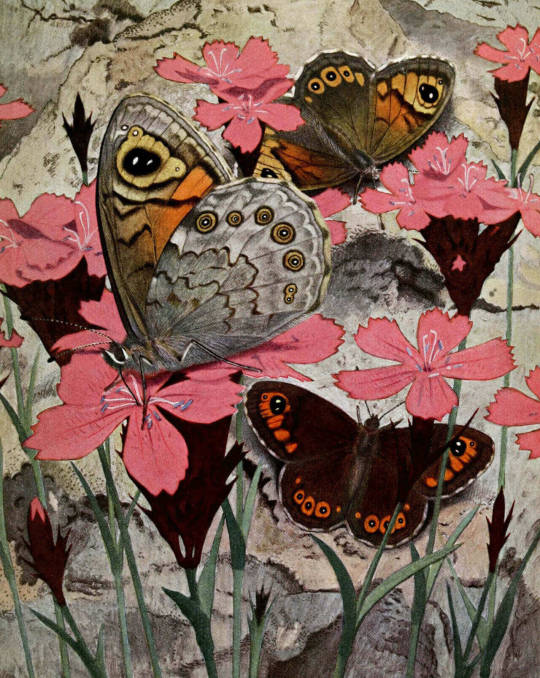
Lasiommata maera | Les Papillons dans la Nature (1934) | Paul-André Robert (1901-1977)
569 notes
·
View notes
Text
Reading List 2023
Ocean Vuong: Night Sky With Exit Wounds
Alena Mornštajnová: Hana
Wolfgang Benz: Theresienstadt. Ein Geschichte von Täuschung und Vernichtung.
Jáchym Topol: Die Teufelswerkstatt [org. title: Chladnou zemí]
Ocean Vuong: Time is a Mother
Richard Siken: Crush
Ben Nevis: Die Drei ??? Die Yacht des Verrats
Frank Wedekind: Frühlings Erwachen (reread)
James Ellroy: Die Schwarze Dahlie [org. title: The Black Dahlia]
André Marx: Die Drei ??? und der Puppenmacher
Evelyn Boyd: Rocky Beach Crimes #2. Mord unter Palmen.
Peter Hallama: Nationale Helden und jüdische Opfer. Tschechische Repräsentationen des Holocaust.
Brigitte Johanna Henkel-Waidhofer: Die Drei ??? Späte Rache
Kim Newman: Professor Moriarty. The Hound of the D‘Urbervilles. (reread)
Vera Schiff: The Theresienstadt Deception. The Concentration Camp the Nazis Created to Deceive the World.
Evelyn Boyd: Rocky Beach Crimes #2. Mord unter Palmen. (reread)
Josef Bor: Die verlassene Puppe [org. title: Opuštěná panenka]
Kari Erlhoff: Rocky Beach Crimes #1. Tödliche Törtchen.
Susanna Partsch: Wer klaute die Mona Lisa? Die berühmtesten Kunstdiebstähle der Welt.
Kathy Reichs: Virals #1. Tote können nicht mehr reden. [org. title: Virals] (reread)
Arthur Schnitzler: Reigen (reread)
Evelyn Boyd: Die Drei ??? Teuflisches Foul
Faye Kellerman: Der Zorn sei dein Ende [org. title: The Hunt]
J.D. Salinger: The Catcher in the Rye
Władysław Szlengel: Was ich den Toten las [org. title: Co czytałem umarłym]
Hanna Krall: Dem Herrgott Zuvorkommen [org. title: Zdążyć przed Panem Bogiem]
Ursula K. Le Guin: The Dispossessed
Thomas Mann: Der Tod in Venedig
James Oswald: Natural Causes. An Inspector McLean Novel.
Sylvia Plath: The Bell Jar (reread)
Christoph Dittert: Die Drei ??? Melodie der Rache
Maria Rolnikaitė: Mein Tagebuch [org. title: Ja dolžna rasskazat']
Mark Thompson: Leatherfolk. Radical Sex, People, Politics and Practice.
James Baldwin: Giovanni‘s Room
Christopher Tauber, Hanna Wenzel: Rocky Beach. Eine Interpretation.
Lorraine Vivian Hansberry: A Raisin in the Sun
Jonathan Kellerman: Unnatural History. An Alex Delaware Novel.
Robert Arthur: Die Drei ??? und die Geisterinsel. [org. title: The Three Investigators in the Secret of Skeleton Island]
Evelyn Boyd: Rocky Beach Crimes #3. Eiskalter Rausch.
André Marx: Die Drei ??? Labyrinth der Götter
John Barth: Lost in the Funhouse
Langston Hughes: Selected Poems of Langston Hughes.
Claude McKay: Harlem Shadows. The Poems of Claude McKay.
Jonathan Kellerman: Exit. Ein Alex Delaware Roman. [org. title: Devil‘s Waltz. An Alex Delaware Novel.] (reread)
David Henry Hwang: M Butterfly
James Oswald: The Book of Souls. An Inspector McLean Novel.
Jonathan Kellerman: Time Bomb. An Alex Delaware Novel. (reread)
Manuela Günter: Überleben schreiben. Zur Autobiographik der Shoah.
Birgit Kröhle: Geschichte und Geschichten. Die literarische Verarbeitung von Auschwitz-Erlebnissen.
Alexander F. Spreng: Der Fluch (reread)
Sibylle Schmidt: Zeugenschaft. Ethische und politische Dimensionen.
Sibylle Schmidt: Ethik und Episteme der Zeugenschaft
Kari Erlhoff & Christoph Dittert: Die Drei ??? und die Salztote
Jeanette McCurdy: I‘m Glad My Mom Died
E.T.A. Hoffmann: Der Sandmann
Hendrik Buchna: Die Drei ??? Drehbuch der Täuschung
Michael Scott: The Secrets of the Immortal Nicholas Flamel #2. The Magician. (reread)
Alain Locke: The New Negro
Mascha Kaléko: Großstadtliebe. Lyrische Stenogramme.
Marco Sonnleitner: Die Drei ??? Der Tag der Toten
Georg Heym: Gedichte [herausgegeben von Stephan Hermlin]
Rose Ausländer: Hinter allen Worten. Gedichte. [herausgegeben von Helmut Braun]
Vladimir Nabokov: Lolita
Paul Celan: Ausgewählte Gedichte. Zwei Reden. [herausgegeben von Günther Busch]
Rich Cohen: Lake Shore Drive [org. title: Lake Effect]
Jan T. Gross: Neighbors. The Destruction of the Jewish Community in Jedwabne, Poland.
Kathy Reichs: Virals #2. Nur die Tote kennt die Wahrheit. [org. title: Seizure]
Jonathan Kellerman: Bones. An Alex Delaware Novel. (reread)
Akwaeke Emezi: You made a Fool of Death with your Beauty
Friedrich Schiller: Maria Stuart
Bret Easton Ellis: American Psycho
Christian Handel: Die Hexenwald-Chroniken #2. Palast aus Gold und Tränen.
Maurice Leblanc: Arsène Lupin und der Schatz der Könige von Frankreich [org. title: L'Aiguille creuse]
E.T.A. Hoffmann: Nussknacker und Mausekönig
Marco Sonnleitner: Die Drei ??? Panik im Park
Ben Nevis: Die Drei ??? Tal des Schreckens
Michael Borlik: Ihr mich auch
Robert Arthur: Die Drei ??? und der grüne Geist [org. title: Alfred Hitchcock and the Three Investigators in the Mystery of the Green Ghost]
Barbara Köhler: Niemands Frau. Gesänge.
Christoph Dittert: Die Drei ??? Hotel der Diebe
Cornelia Funke: Tintenwelt #4. Die Farbe der Rache.
DNF:
Thomas Ziebula: Paul Stainer #1. Der rote Judas.
Faye Kellerman: Mord im Garten Eden [org. title: The Garden of Eden and Other Criminal Delights]
#end of 2023#reading list#bookblr#readblr#to my utter surprise i just breezed through some books in december and did end up reaching my goal of 80 books#read books that were originally published in: german - english - czech - polish - lithuthian (i think) - french#read more poetry than ever before i think#read some real 'classics' and enjoyed most of them a lot#if you're curious about anything on here or just wanna talk about any of these books *please* send me an ask or something#i love talking about books
8 notes
·
View notes
Text
masterlist!
TURN! Washington's Spies
Caleb Brewster
George Washington
Benjamin Tallmadge
Marquis de Lafayette
Robert Townsend
Ensign [Thomas] Baker
John Graves Simcoe
Hercules Mulligan
John André
Edmund Hewlett
Selah Strong
Alexander Hamilton
Robert Rogers
misc. headcanons
The Dreamer Comic
Nathan Hale
Thomas Knowlton
Enoch Hale
Sons of Liberty
Paul Revere
Sam Adams
Dr. Joseph Warren
John Adams
1776 Musical
Thomas Jefferson
Richard Henry Lee
Roger Sherman
*Misc
Charles Sumner
8 notes
·
View notes
Text
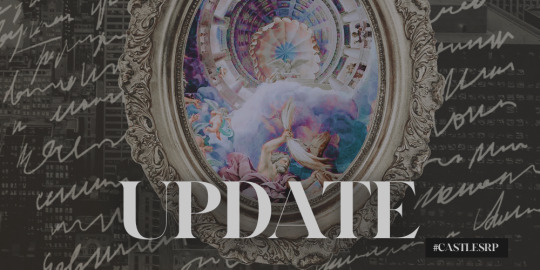
Face Claim List
Below the cut, you will find our list of face claims featured on our canon list. Enjoy this sneak peak at what is coming your way when the canon lists start being released this week!
FC List:
Abigail Cowen
Aishwarya Rai Bachchan
Amita Suman
Amy Adams
Ana de Armas
André De Shields
Andrew Garfield
Angela Bassett
Anna Kendrick
Anne Hathaway
Anthony Anderson
Anthony Mackie
Anya Chalotra
Anya Taylor Joy
Aja Naomi King
Avan Jogia
Avantika
Audra McDonald
Austin Butler
Beanie Feldstein
Ben Barnes
Beyoncé
BD Wong
Bette Midler
Caleb McLaughlin
Camila Mendes
Catherine O'Hara
Charles Melton
Chiwetel Ejiofor
Chloe Bennet
Chloe Bailey
Christina Hendricks
Christina Nadin
Chrissy Metz
Cody Christian
Constance Wu
Courtney Eaton
Dakota Johnson
Danai Gurira
Daniel Ezra
Daniel Wu
Danny Trejo
David Harbour
Deepika Padukone
Denzel Washington
Dev Patel
Diana Silvers
Diane Keaton
Dianna Agron
Dove Cameron
Dylan O'Brien
Eddie Redmayne
Eiza González
Emily Alyn Lind
Eva Longoria
Ewan McGregor
Fan Bingbing
Felix Mallard
Florence Pugh
Froy Gutierrez
Gabrielle Union
Gemma Chan
George Takei
Gillian Anderson
Gina Rodriguez
Gina Torres
Hailee Steinfeld
Halle Bailey
Harrison Ford
Harry Shum JR
Harry Styles
Henry Cavill
Hero Fiennes Tiffin
Hunter Schafer
Hugh Jackman
Idris Elba
J. Cameron-Smith
Jacob Artist
Jacob Elordi
Jameela Jamil
James McAvoy
Jamie Chung
Jamie Lee Curtis
Jasmin Savoy Brown
Jason Momoa
Jason Sudekis
Jean Smart
Jeff Goldblum
Jeffrey Wright
Jenna Ortega
Jensen Ackles
Jesse Williams
Jessica Chastain
JK Simmons
Joe Locke
John Boyega
John Cho
John Krasinski
Jon Hamm
Jonathan Bailey
Jordan Connor
Jordan Peele
Julianne Moore
Justice Smith
Kate Winslet
Kathryn Hahn
Kathryn Newton
Keanu Reeves
Keith Powers
Keke Palmer
Kerry Washington
Kit Connor [1]
Kit Connor [2]
KJ Apa
Kristen Bell
Kumail Nanjiani
Lana Condor
Laura Harrier
Lauren Ridloff
Leonardo DiCaprio
Letita Wright
Lili Reinhart
Liv Hewson
Logan Browning
Logan Lerman
Loretta Devine
Lupita Nyong'o
Mädchen Amick
Madelyn Cline
Madison Bailey
Mahershala Ali
Manny Jacinto
Manny Montana
Margot Robbie
Mark Consuelos
Mark Hamill
Mario Lopez
Mason Gooding
Maude Apatow
Megan thee Stallion
Melanie Lynskey
Melissa Barrera
Michael Cimino
Michael Evans Behling
Michael Fassbender
Michael Peña
Michael Shannon
Michelle Yeoh
Morgan Freeman
Naomi Scott
Natalia Dyer
Natasha Liu Bordizzo
Nina Dobrev
Noah Centineo
Normani
Octavia Spencer
Olivia Coleman
Olivia Rodrigo
Oscar Isaac
Paul Rudd
Pedro Pascal
Phoebe Deynover
Phoebe Tonkin
Phylicia Rashad
Priyanka Chopra
Rachel Weisz
Rachel Zegler
Rahul Kohli
Reese Witherspoon
Regé-Jean Page
Renee Rapp [1]
Renee Rapp [2]
Riz Ahmed
Robert Pattinson
Robert Downey JR
Rome Flynn
Rosamund Pike
Rose Byrne
Rudy Pankow
Ryan Gosling
Ryan Guzman
Ryan Reynolds
Sadie Sink
Sam Claflin
Samantha Logan
Samara Weaving
Sandra Bullock
Sandra Oh
Sara Ramirez
Sarah Jeffrey
Sarah Paulson
Sebastian Stan
Selena Gomez
Sigourney Weaver
Simu Liu
Shawn Mendes
Skeet Ulrich
Sophia Ali
Sophia Bush
Sophie Turner
Sonam Kapoor
Sophie Thatcher
Sterling K. Brown
Steve Martin
Steven Yeun
Storm Reid
Sydney Sweeney [1]
Sydney Sweeney [2]
Taika Waititi
Tati Gabrielle
Taraji P. Henson
Taron Egerton
Taye Diggs
Taylor Zakhar Perez
Ted Danson
Timothée Chalamet
Thomas Doherty
Tom Blyth
Tom Ellis
Tom Hardy
Tom Holland
Tony Goldwyn
Tyler James Williams
Tyler Posey
Uzo Adubo
Victoria Pedretti
Viola Davis
Whoopi Goldberg
Wolfgang Novogratz
Will Smith
Willem Dafoe
William Jackson Harper
Winona Ryder
Winston Duke
Yasmin Finney
Zayn Malik
Zendaya
Zoey Deutch
6 notes
·
View notes
Text
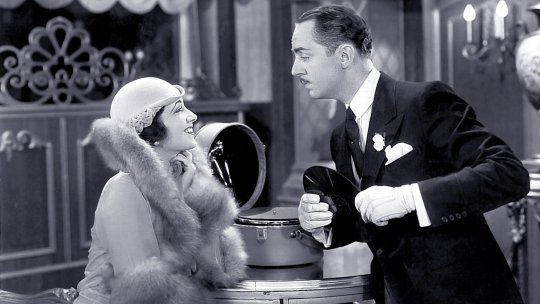
Kay Francis and William Powell in Jewel Robbery (William Dieterle, 1932)
Cast: William Powell, Kay Francis, Helen Vinson, Hardie Albright, Alan Mowbray, André Luguet, Henry Kolker, Spencer Charters, Lee Kohlmar, Clarence Wilson. Screenplay: Erwin Gelsey, based on a play by Ladislas Fodor and a translation by Bertram Bloch. Cinematography: Robert Kurrle. Art direction: Robert M. Haas. Film editing: Ralph Dawson. Music: Bernhard Kaun.
Jewel Robbery is a perfect storm of what would be taboos under the Production Code: Not only does it condone adultery and let crime go unpunished, but it also allows William Powell's jewel thief -- pardon me, robber -- to slip a cigarette laced with an uncommonly potent strain of cannabis to the jewelry store guard, thereby violating the forthcoming ban on drug references in movies. (We are assured that, after a case of the giggles, the guard will fall sound asleep to wake refreshed with no hangover but the munchies.) The adulteress is Baroness Teri (Kay Francis), a golddigger who has married the aging Baron von Horhenfels (Henry Kolker) for his money, while carrying on a liaison with the much younger cabinet member Paul (Hardie Albright). Unfortunately, as Teri tells her confidante Marianne (Helen Vinson), Paul is a bit of a bore. She makes the best of it, however, swanning around in gowns designed by Orry-Kelly that defy the law of gravity and raking in the jewels her husband provides. Which leads her to the jewelry store that is about to be robbed and to the robber himself, with whom she swiftly falls in love. The rest is a story of crime and absence of punishment that ends well for Teri and her thief -- uh, robber. Francis and Powell were never better, and there's a good deal of charm and wit to the film. It could have been directed with a lighter touch: William Dieterle is better known for the somewhat stuffy biopics The Story of Louis Pasteur (1935), The Life of Emile Zola (1937), and Dr. Ehrlich's Magic Bullet (1940), and he doesn't have the Viennese insouciance that the script needs. But he lets his actors provide that, with good results.
13 notes
·
View notes